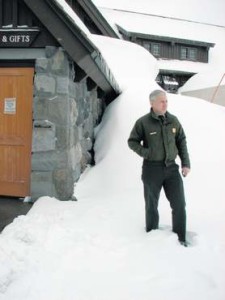Crater Lake’s new boss fulfills a lifelong dream
Mail Tribune
Medford, Oregon
May 04, 2008
As a 7-year-old boy in Wheeling, W.Va., Craig Ackerman recalled opening his Weekly Reader magazine to marvel at a photograph of a ranger skiing past a second-story window at the Crater Lake National Park headquarters way out west in Oregon.
“I was in the second grade at the time,” Ackerman said. “I remember saying, ‘I really want to go there some day.’
“I can still see the image of the ranger skiing past that window,” he added. “In fact, it looked like one of those stone houses we have here.”
Ackerman, 52, is the new superintendent at the park where the snow is currently up to the second-story windows at the headquarters. He replaces former Superintendent Chuck Lundy, who retired late last year.
His first full day on the job will be May 11.
Yet Ackerman is no stranger to Oregon: For the past 17 years, he has been the Oregon Caves National Monument superintendent.
“It’s the pinnacle of a person’s career in the National Park Service to get to serve in one of these old-line traditional national parks like Crater Lake,” he said. “And this park is one of the oldest parks we have in the system.”
Indeed, the park was created 14 years before the park service was born in 1916.
Before working at the Oregon Caves, he served as a national park ranger at the 450-mile long Natchez Trace Parkway in Mississippi, Alabama and Tennessee as well as the Shiloh National Military Park in Tennessee. He joined the agency in 1985.
Before that, he served as superintendent for state parks in West Virginia. He has a bachelor of science degree in wildland recreation administration from West Virginia University.
He and his wife, Cynthia, who live in Grants Pass, have two children, both grown. His wife works in medical administration.
While they plan to keep their Grants Pass home, Ackerman expects to be spending time at the superintendent’s cottage at the park headquarters.
“It’s a little too far to drive every day,” he said of the nearly 100-mile trip. “There is also a lot of value in me getting to know the community up here, experiencing both the working and living conditions.”
Ackerman will be in charge of about 50 permanent staff members along with another 60 to 70 seasonal employees.
At nearly 2,000 feet deep, Crater Lake, which draws nearly half a million visitors a year, is the deepest lake in the United States with some of the most pristine water on the globe. The annual average snowfall is 534 inches.
Ackerman acknowledges that times have changed since he was a youngster in West Virginia dreaming of visiting national parks.
“Throughout our society, people are becoming more attached to electronic media and instant gratification,” he said. “Kids going out and camping is on a decline. Backpacking is on a decline.”
Instead, young people are spending more time in front of a computer or television screen, he said.
“Electronics are designed to provide immediate, high-stimulus gratification,” he said. “Our challenge is to get more people out into the natural world. There are a lot of psychological as well as physiological benefits to getting people outside.”
As a youngster, he recalls looking forward to summer weekends in which his family enjoyed picnicking, camping and hiking in the woods.
Those were the years when national parks were also destination points for many vacationing families, he said.
“Once a year you would pile the kids in the station wagon and drive around for two or three weeks visiting different national parks,” he said. “You would stop at the Wigwam Palace and the world’s largest ball of twine on the way.
“We don’t have that anymore,” he continued. “What you have is dueling couples, both working high-stress jobs, both unable to take off two or three weeks without being punished severely for it with a huge workload when they get back to work.”
As a result, people tend to take shorter vacations closer to home, he said, noting that trend gives national parks an opportunity to attract more families who live relatively close to a park.
“We also want to work with kids while they are in the school system to get them out to parks,” said Ackerman who was on the National Education Council for three years.
At Crater Lake, the agency hopes to attract young people by expanding the Junior Ranger program and drawing them to the new science and learning center at the park.
“We want to bring young people back into the fold,” he said, adding, “If we ever lose the appreciation of the American public for these places, then we lose the support for protecting and preserving these wonderful places.”
Reach reporter Paul Fattig at 776-4496 or e-mail him at pfattig@mailtribune.com.
Other pages in this section


